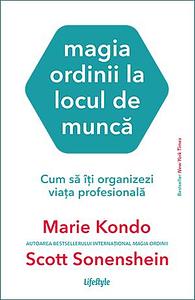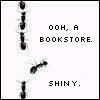You need to sign in or sign up before continuing.
Take a photo of a barcode or cover
Felt so inspired I bought a new desk and can’t wait to organize it and do magical things!
hopeful
informative
reflective
fast-paced
hopeful
informative
inspiring
lighthearted
fast-paced
hopeful
informative
inspiring
reflective
slow-paced
An enjoyable book about creating joy in your work life. It includes helpful tips about organizing work spaces, and overall is motivating and inspiring.
Only 3 stars. It's not as good as her first book about cleaning your home. It's not a bad book, but it did have some shortcomings.
first of all, Marie wrote only a small part of this book. The largest part was written/told by a man named Scott. And his parts were not as good as Marie's parts. Okay, they were okay, but he did my big no-no's for a self-help book.
1. It was too cluttered. He took up so many different areas of work. Yes, work involves a bunch of stuff, but you need to focus on certain areas, you need to kill your darlings. even if some of what he talked about was interesting, not everything was universal, it did not apply for every person. He talked about stuff only a boss would need, and then if you work in groups, and some parts were very office oriented. I could not relate to it all, and so it was hard to find energy to focus on his parts because so much was not for me, and I could not understand when it was or wasn't because it all went into each other.
2. It did not feel genuine. I do not now if Scott usually talk or write about sparking joy but he talked about it so much but it felt like he just used Marie's concept and tried to force it into his own teachings. He talked about sparking joy for so much stuff, and I just felt like he used it because that was the name of the book, not because he really used it normally.
3. a bunch of stuff was not that interesting. Sorry, but it was not that revolutionary. Even Marie's parts. she mostly just talked about what she already has gone into more depth in her earlier book about cleaning, and what Scott wrote about I can find on so many other places. Nothing that was a wow moment.
The things I did enjoy was to listen to the parts Marie had written. even though it did not feel new, I like her unique way of looking at the world. I also found Scott's parts about meetings to be kind of good. Sure, a lot of it the normal employe cannot do anything about, but it's good to think about if a meeting is for you, and what can be done to make it more effective.
It was an okay book. If I would have known Marie had such a small part, I probably would not have read it at all actually.
However, the last chapter by Marie about how she and her husband structure their work lives was really good and I could have seen a whole book about that. I wanted to have a deep dive in the three steps they do to structure.
Also, a book about being a working parent and keeping a clean home with children would have been awesome. I am not a parent, but the short paragraph about how she had trouble keeping clean with small children, that made me excited. Felt like something a bunch of people would be interested in, how to do small things to keep it structured in your home with children.
first of all, Marie wrote only a small part of this book. The largest part was written/told by a man named Scott. And his parts were not as good as Marie's parts. Okay, they were okay, but he did my big no-no's for a self-help book.
1. It was too cluttered. He took up so many different areas of work. Yes, work involves a bunch of stuff, but you need to focus on certain areas, you need to kill your darlings. even if some of what he talked about was interesting, not everything was universal, it did not apply for every person. He talked about stuff only a boss would need, and then if you work in groups, and some parts were very office oriented. I could not relate to it all, and so it was hard to find energy to focus on his parts because so much was not for me, and I could not understand when it was or wasn't because it all went into each other.
2. It did not feel genuine. I do not now if Scott usually talk or write about sparking joy but he talked about it so much but it felt like he just used Marie's concept and tried to force it into his own teachings. He talked about sparking joy for so much stuff, and I just felt like he used it because that was the name of the book, not because he really used it normally.
3. a bunch of stuff was not that interesting. Sorry, but it was not that revolutionary. Even Marie's parts. she mostly just talked about what she already has gone into more depth in her earlier book about cleaning, and what Scott wrote about I can find on so many other places. Nothing that was a wow moment.
The things I did enjoy was to listen to the parts Marie had written. even though it did not feel new, I like her unique way of looking at the world. I also found Scott's parts about meetings to be kind of good. Sure, a lot of it the normal employe cannot do anything about, but it's good to think about if a meeting is for you, and what can be done to make it more effective.
It was an okay book. If I would have known Marie had such a small part, I probably would not have read it at all actually.
However, the last chapter by Marie about how she and her husband structure their work lives was really good and I could have seen a whole book about that. I wanted to have a deep dive in the three steps they do to structure.
Also, a book about being a working parent and keeping a clean home with children would have been awesome. I am not a parent, but the short paragraph about how she had trouble keeping clean with small children, that made me excited. Felt like something a bunch of people would be interested in, how to do small things to keep it structured in your home with children.
I thought this was an interesting and motivating book. Okay so confession time, this book arrived addressed to me along with other books I did order, but I did not order this book at all. I contacted the place I ordered the book from and they said I didn't have to return it so I decided to keep it and read it. This was actually a pretty quick read and I do think I got something from it even though right now I'm not actually working I'm looking forward to applying these lessons to my own space when I get back to uni for my Master thesis. I do love both the writers, they both have an interesting voice and I thought it was interesting that they had both anecdotes but also actual research about the psychology of tidying up and how being organized helps you in different ways. Should I ever be in the position to get a house I will probably pick up some of these books to read and learn from.
Although this is not an amazing book (probably because of the nature of it - I mean its a non-fiction about tidying) I do think I'll re-read it whenever I do actually get a job (someone please not-hate me enough to hire me - I swear I'm semi competent).
Although this is not an amazing book (probably because of the nature of it - I mean its a non-fiction about tidying) I do think I'll re-read it whenever I do actually get a job (someone please not-hate me enough to hire me - I swear I'm semi competent).
informative
inspiring
slow-paced
For folks who are familiar with the Marie Kondo method of tidying, there won’t be anything super groundbreaking here. And some of the chapters won’t apply to everyone, depending on the exact nature of their work. But! I still found this book super inspiring and was motivated to start tidying my home office ASAP.
I was fairly sceptical about this book despite being low-key pro Marie Kondo, but it seemed to have some interesting points to make about adjusting (especially office) work attitudes and environments. Kondo covers the physical spaces while Sonenshein tackles the digital and other work specific things like meetings but it still feels like both parts are well knitted in terms working towards a more joyous work environment. #BookClub4M #BusinessNonFiction
I'm definitely guilty of referring to this only as "Marie Kondo's new book" even though co-author Scott Sonenshein actually penned more of the chapters. This makes sense, since Kondo is more well known, but Sonenshein definitely deserves credit for bringing in his psychology perspective and focusing on the non-physical parts of our work that need to be tidied.
I read this while working from home during the coronavirus pandemic, so although Kondo's chapters on tidying your physical work space made me actually look forward to going back to the office, Sonenshein's chapters on tidying your teams, email, meetings, and decision-making were more immediately applicable.
I would recommend this book to all my coworkers who can never find the email I sent them two hours ago and need me to resend it. I also recommend it to my friends who are stuck in a dead-end job that makes them miserable as a way for them to minimize their misery while also clearing space in their mind to work towards a better situation.
Also, am I the only one that finds that the four types of values from the quiz in chapter two map nicely onto the Hogwarts houses? People who most value learning are Ravenclaws, those who get joy from achieving are Slytherins, those thriving in freedom are Gryffindors, and those who love connecting are Hufflepuffs.
I read this while working from home during the coronavirus pandemic, so although Kondo's chapters on tidying your physical work space made me actually look forward to going back to the office, Sonenshein's chapters on tidying your teams, email, meetings, and decision-making were more immediately applicable.
I would recommend this book to all my coworkers who can never find the email I sent them two hours ago and need me to resend it. I also recommend it to my friends who are stuck in a dead-end job that makes them miserable as a way for them to minimize their misery while also clearing space in their mind to work towards a better situation.
Also, am I the only one that finds that the four types of values from the quiz in chapter two map nicely onto the Hogwarts houses? People who most value learning are Ravenclaws, those who get joy from achieving are Slytherins, those thriving in freedom are Gryffindors, and those who love connecting are Hufflepuffs.




